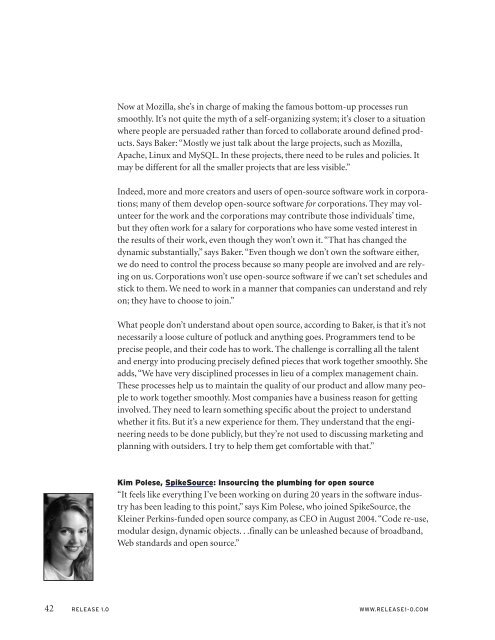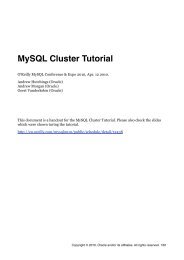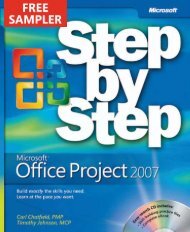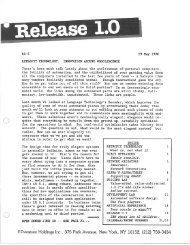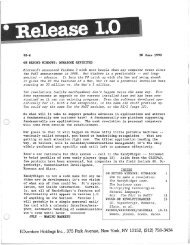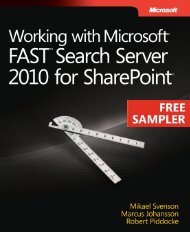The World Wide World: IT Ain't Just the Web ... - Cdn.oreilly.com
The World Wide World: IT Ain't Just the Web ... - Cdn.oreilly.com
The World Wide World: IT Ain't Just the Web ... - Cdn.oreilly.com
Create successful ePaper yourself
Turn your PDF publications into a flip-book with our unique Google optimized e-Paper software.
Now at Mozilla, she’s in charge of making <strong>the</strong> famous bottom-up processes run<br />
smoothly. It’s not quite <strong>the</strong> myth of a self-organizing system; it’s closer to a situation<br />
where people are persuaded ra<strong>the</strong>r than forced to collaborate around defined products.<br />
Says Baker: “Mostly we just talk about <strong>the</strong> large projects, such as Mozilla,<br />
Apache, Linux and MySQL. In <strong>the</strong>se projects, <strong>the</strong>re need to be rules and policies. It<br />
may be different for all <strong>the</strong> smaller projects that are less visible.”<br />
Indeed, more and more creators and users of open-source software work in corporations;<br />
many of <strong>the</strong>m develop open-source software for corporations. <strong>The</strong>y may volunteer<br />
for <strong>the</strong> work and <strong>the</strong> corporations may contribute those individuals’ time,<br />
but <strong>the</strong>y often work for a salary for corporations who have some vested interest in<br />
<strong>the</strong> results of <strong>the</strong>ir work, even though <strong>the</strong>y won’t own it. “That has changed <strong>the</strong><br />
dynamic substantially,” says Baker. “Even though we don’t own <strong>the</strong> software ei<strong>the</strong>r,<br />
we do need to control <strong>the</strong> process because so many people are involved and are relying<br />
on us. Corporations won’t use open-source software if we can’t set schedules and<br />
stick to <strong>the</strong>m. We need to work in a manner that <strong>com</strong>panies can understand and rely<br />
on; <strong>the</strong>y have to choose to join.”<br />
What people don’t understand about open source, according to Baker, is that it’s not<br />
necessarily a loose culture of potluck and anything goes. Programmers tend to be<br />
precise people, and <strong>the</strong>ir code has to work. <strong>The</strong> challenge is corralling all <strong>the</strong> talent<br />
and energy into producing precisely defined pieces that work toge<strong>the</strong>r smoothly. She<br />
adds, “We have very disciplined processes in lieu of a <strong>com</strong>plex management chain.<br />
<strong>The</strong>se processes help us to maintain <strong>the</strong> quality of our product and allow many people<br />
to work toge<strong>the</strong>r smoothly. Most <strong>com</strong>panies have a business reason for getting<br />
involved. <strong>The</strong>y need to learn something specific about <strong>the</strong> project to understand<br />
whe<strong>the</strong>r it fits. But it’s a new experience for <strong>the</strong>m. <strong>The</strong>y understand that <strong>the</strong> engineering<br />
needs to be done publicly, but <strong>the</strong>y’re not used to discussing marketing and<br />
planning with outsiders. I try to help <strong>the</strong>m get <strong>com</strong>fortable with that.”<br />
Kim Polese, SpikeSource: Insourcing <strong>the</strong> plumbing for open source<br />
“It feels like everything I’ve been working on during 20 years in <strong>the</strong> software industry<br />
has been leading to this point,” says Kim Polese, who joined SpikeSource, <strong>the</strong><br />
Kleiner Perkins-funded open source <strong>com</strong>pany, as CEO in August 2004. “Code re-use,<br />
modular design, dynamic objects. . .finally can be unleashed because of broadband,<br />
<strong>Web</strong> standards and open source.”<br />
42 RELEASE 1.0 WWW.RELEASE1-0.COM


